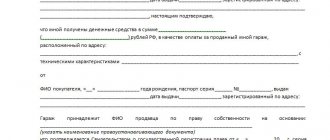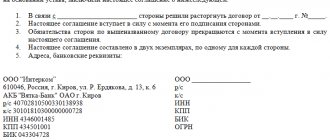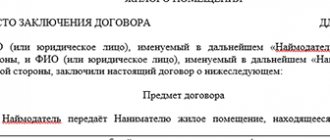Rules on purchase and sale in the Civil Code and the exchange agreement
Although the chapter of the Civil Code dedicated to and defining the contract for the exchange of real estate or movable property establishes that certain rules on purchase and sale may be applied to it, it is also clarified that such rules must not be in conflict with this chapter and in general with the essence exchanges.
For example, these include articles that involve payment for any products or goods.
It is known that barter does not imply and is not accompanied by monetary payments. The only exception is situations in which objects of property that differ in value are exchanged. Then, accordingly, an additional payment is made in the price.
The essence of the concept of barter agreement
According to the Civil Code of the Russian Federation, a barter agreement means a transaction in which each party undertakes to transfer the ownership of a product to the other party exclusively in exchange for another product. In terms of its economic content, this type of transaction is comparable to a purchase and sale agreement, therefore the general rules for drafting are the same. Barter transactions involving the transfer of ownership of real estate are subject to mandatory state registration; it must be accompanied by an acceptance certificate, signed directly during the exchange of documents and keys.
This is important to know: Purchase and sale agreement for a mortgaged apartment: sample
Essential terms of the exchange agreement
- The subject of this type of relationship is that information about the immovable subject of the transaction must be specified, indicating its cadastral characteristics (location, area, etc.).
- For exchange transactions of residential premises - a list of persons retaining the right to use the property after a change of owner.
- Additional conditions on which agreement must be reached at the request of the parties to the transaction.
- The value of the transferred real estate asset (the price of all goods).
In addition, if the values of the transferred objects are unequal, a mandatory condition specified in advance in the agreement is the amount of the additional payment; in the absence of this information, the price of the real estate is considered equal.
A distinctive characteristic of exchange transactions is that both participants act as both the seller and the buyer of the goods, and therefore are endowed with the same rights and obligations of either party.
An important point when concluding complex agreements is that the exchange of goods occurs only between objects whose rights are registered.
Main features of the barter agreement
- The focus is on the transfer of property into ownership (convergence with purchase and sale transactions) - the return of property is excluded.
- Counter provision is an exchange of goods exclusively for goods with a number of exceptions:
- availability of additional payment in case of non-equivalence;
- exchange of other property for real estate (for example, a car for an apartment);
- exchange of large real estate for several small ones (for equal value of the transaction
The moment of transfer of ownership is the simultaneous transfer of ownership when the parties fulfill all the terms of the agreement and undergo state registration. If one of the parties fails to register the transaction, compensation for damages due to the delay is provided.
Approximate list of documents required for state registration of real estate exchange agreements
- Statement from the parties to the transaction (their official representatives).
- Confirmation of registration payment (copy, original).
- For individuals: identification documents. For legal entities: constituent documents, documents for registering as a taxpayer with assignment of TIN (original, copies), extract from the Unified State Register of Legal Entities.
- Confirmation of the authority of the representative (original, copy of the power of attorney).
- Original written agreements - one copy for each of the parties to the transaction and one for attachment to the case.
- Documents confirming ownership of the material being exchanged.
- Cadastral passports of the transaction objects (original, copy certified by the authority that issued this document).
- Confirmation of transfer of real estate.
- Permission from guardianship authorities if a minor has part of the property.
- Consent of one of the spouses when purchasing real estate during marriage.
What is property?
According to the civil legislation of the Russian Federation, property includes:
- immovable things:
land plots and structures firmly connected with them, including buildings, structures, houses, outbuildings and structures, apartments, garages, sheds, garden houses and other non-residential premises; - any movable things,
including: cars, motorcycles, trailers, boats, boats, securities, money, shares in the authorized capital of LLCs, objects of art, tools, equipment, inventory, raw materials, products, hunting rifles, household furnishings and household items ; - intellectual property rights and other non-property rights.
An exception for any types of contracts are those things the circulation of which is prohibited or limited by law (drugs, weapons, ammunition, etc.)
SUBJECT OF THE AGREEMENT
1.1. Participant I undertakes to transfer by way of exchange to Participant II: ;
- unit ;
- number of units ;
- warranty period of operation (storage, shelf life).
1.2. Participant II undertakes to transfer by exchange to Participant I: ;
- unit ;
- number of units ;
- warranty period of operation (storage, shelf life).
1.3. The parties acquire ownership of the goods specified in clauses 1.1 and 1.2 after the mutual transfer of goods.
ADDITIONAL TERMS
6.1. Additional terms and conditions under this agreement: .
6.2. In all other respects not provided for in this agreement, the parties are guided by the current civil legislation of Russia regulating the supply of goods.
FINAL TERMS
7.1. All changes and additions to this agreement are valid only if they are in writing and signed by both parties.
7.2. The headings of the articles are intended for ease of reference and will not be taken into account when interpreting this agreement.
7.3. This agreement expresses the entire contractual terms and understanding between the parties with respect to all matters mentioned herein, and all previous discussions, promises, representations between the parties, if any, shall be superseded by the text above.
7.4. This agreement is drawn up in copies having equal legal force.
7.5. The signed agreement comes into force from "" 2020 to "" 2020.
Inheritance by will
Inheritance by law is much more common than inheritance by will.
This is due, first of all, to the fact that during their lifetime people do not have time to draw up their will, or draw it up improperly. In the Civil Code of the Russian Federation, Chapter 63 is devoted to this issue. First of all, it is worth starting with the fact that inheritance by law is a type of inheritance whose distinctive feature lies in the heirs. They are exclusively those citizens who are relatives of the deceased person.
It should be noted that if several people are included in one line of heirs, then all property is divided between them in equal shares (
clause 2 art. 1141
Civil Code of the Russian Federation).
https://www.youtube.com/watch{q}v=https:tv.youtube.com
Any person included in this queue has the right to refuse to receive his share and give it to another heir (Article 1158 of the Civil Code of the Russian Federation).
But there are cases when there is no one to accept the inheritance. This can happen for reasons such as:
- absence of relatives-heirs;
- refusal of the heirs from the proposed inheritance;
- the will does not indicate all the property of the testator;
- unworthy heirs.
An inheritance that there is no one to accept should be called escheat. This is stated in Article 1151 of the Civil Code of the Russian Federation. Property that has no heirs is usually transferred to the ownership of an urban or rural settlement. The recognition of the inheritance as escheat can only occur after six months from the date of death of the testator. If the heir has irrefutable evidence why he missed the deadline for entering into inheritance, then he has the right to restore this deadline.
Example
On January 1, 2016, an elderly resident of the village of Nikolskoye, Belgorod district, died. She owns a one-room apartment. My grandmother had no relatives and there was no care for her or her living quarters. Six months later, on June 1, 2016, the administration of the Nikolskoye rural settlement received a certificate of inheritance for this apartment. Moreover, the notary described in detail all the property located in the apartment, and a licensed specialist assessed the value of the property and the things contained in it.
The law established a certain order of persons, consisting of seven lines that follow each other. These queues look like this:
- Children, spouse, parents (Article 1142 of the Civil Code of the Russian Federation);
- Full and half brothers and sisters of the deceased, parents of the father and mother - i.e. grandparents (Article 1143 of the Civil Code of the Russian Federation);
- The testator's aunts and uncles are also the brothers/sisters of his parents (Article 1144 of the Civil Code of the Russian Federation);
- Great-grandparents of the testator;
- Cousins/granddaughters and great-uncles and grandmothers;
- Cousins/uncles, cousins/nephews, cousins/great-grandchildren;
- Stepsons, stepdaughters, stepfather, stepmother of the testator (Article 1145 of the Civil Code of the Russian Federation).
There is such a term in law as inheritance by right of representation. This right applies in cases where the main heir dies along with the testator or before the opening of the inheritance.
Example
The Ivanovs' spouses died in a fatal accident. Their adult son, who was driving this car, died with them. If he had survived, he would have been the sole heir to the property of his parents (the spouses had no parents), but since the heir died, the grandchildren of the spouses would inherit.
Inheritance by will is a type of inheritance that represents the transfer of property, rights and associated obligations from the deceased to another person through a written document written during the lifetime of the testator. Such a document is called a will.
A will is a person’s written wish that determines the fate of a person’s civil legal relations in the event of his death. Only a person with full legal capacity has the right to draw up such a document.
Heirs under a will should be called those persons who are directly indicated in the document, and the person who executed the act of will should be called the testator or testator.
The testator has the right to cancel or amend the will he has written at any time, without giving a reason. He can revoke the previous will by writing a new document.
It is worth noting that not always all the property described in the document is received by the person specified in the will. The law establishes the right to a compulsory share for persons who are not included in the written document. These persons are:
- minors and disabled children;
- disabled parents;
- spouse);
- citizens who are dependent (Article 1149 of the Civil Code of the Russian Federation).
The heir under the will, in the absence of persons claiming the “obligatory share,” will be able to receive the property specified in the will, for example, an apartment. But if there are several heirs in the will, or in addition to the will there are persons who are entitled to an “obligatory share”, the apartment will be divided into shares.
We invite you to read: Tolstoy's Equal Inheritance - A Story
Currently, the State Duma is considering the issue of obliging the sale of an apartment that was inherited in shares.
To make a will for an apartment, you must first of all have the status of a legally capable person. The deed of will is drawn up exclusively in writing and certified by a notary office. The notary verifies the fact of ownership of such an apartment, accepting all the necessary documents confirming this.
Signing the will with your own hand is a mandatory condition when drawing up such a document. But it happens that for physical reasons a person simply does not have the opportunity to sign it (disabled, paralyzed, etc.), in such cases the signature is placed by other persons, but exclusively in the presence of a notary, indicating the reason why the document is not signed by the testator himself .
The duty of the notary is to warn the witness, as well as the person signing the will instead of the testator
keep secret
and not disseminate information specified in the will (
Art. 1123
Civil Code of the Russian Federation).
If legal norms were violated during the preparation and execution of a will, then such a document can be declared invalid. The main, common reasons may be:
- failure to comply with written form;
- execution of a will by an incapacitated or partially capable person;
- lack of signature;
- the document is not certified by a notary;
- unworthy heirs.
An unworthy heir is a person who cannot claim an inheritance and is therefore limited in this action.
A person can be recognized as an unworthy heir only on the basis of a court decision. A person can receive such a “status” in the following cases:
- if you wanted to obtain property illegally;
- if he claims the property of children, and at the same time is deprived of parental rights;
- did not fulfill obligations towards the testator.
The will itself can be declared invalid either in its entirety or in a separate part. A document is declared invalid only by a court decision, within one year from the time the plaintiff learned about the circumstances that served as the basis for declaring the document invalid. If the will is nevertheless recognized as such, the inheritance will be carried out according to the law (Chapter 63 of the Civil Code of the Russian Federation).
Share allocation
Shares indicated in percentage terms cannot be exchanged. The exchange is permissible only after the shares have been allocated in kind. To do this, the owners must apply to the court with a request to divide the common shared property and determine shares in kind. After a positive decision is made, the owners formalize separate ownership of their shares.
We invite you to read the Complaint against the decision of the economic court to return the statement of claim
The court's decision is based mainly on the certificate of right to inheritance and information from Rosreestr confirming the size of the shares of each heir as a percentage.
After entering into legal force, the decision is submitted for state registration. On its basis, amended information about the owners of shares in this property is entered into the Unified Register. After which, each heir receives a separate extract from the Unified State Register in his name, confirming his ownership.
Procedure for entering into inheritance
The inheritance is considered to be open from the moment when the biological death of the testator occurred (Article 1114 of the Civil Code of the Russian Federation). Within six months after the opening of the inheritance, the heir has the right to determine:
- accept property;
- refuse him.
A citizen accepts an inheritance by writing a corresponding application to a notary public about accepting property through inheritance. Such a document is submitted at the place of opening of the inheritance - the place where the deceased citizen-testator most recently lived.
But the inheritance can be accepted and in fact, for this the heir must perform such actions that make it clear that he treats the inherited property as his own - he paid taxes for it, made repairs (
We suggest you read: Is it possible to return an apartment after purchasing it with a mortgage to the seller?
clause 2 art. 1153
Civil Code of the Russian Federation).
After a person has submitted an application containing consent to accept the inheritance, having all the necessary documents, the notary opens an inheritance case. Six months after the death of the testator, the notary issues an official document to the heir - a certificate of the right to inheritance (Article 1163 of the Civil Code of the Russian Federation).
The list of necessary documents that must be collected before visiting the notary's office, the documents depend on the status of the relative, who he is in relation to the deceased:
- death certificate of the testator - confirms the fact of the death of the testator and establishes the exact date of opening of the inheritance;
- a certificate from his last place of residence - makes it clear where the place of opening of the inheritance is located;
- passport - establishes the identity of the heir;
- will (if any);
- marriage/birth certificate - determines the family relationship of the heir in relation to the deceased person;
- certificate of ownership of the apartment - from July 15, 2016, an extract from the Unified State Register (confirms ownership of the property);
- contract of purchase and sale, exchange, gift (confirms the transfer of ownership of the apartment);
- certificate from the BTI;
- receipt of payment of state duty.
This is only an approximate list of documents; it changes depending on the specific situation and the status of the heir. More accurate information about the documents can be found by contacting the notary who will handle the inheritance case.
First of all, a person who wants to receive an inheritance turns to a notary with a written statement about his intention to accept property from the testator. You can find out the address of the notary's office at the place where the inheritance was opened, or at the address indicated in the will itself.
The heir must contact the notary within six months after the death of the testator, but this process should not be delayed.
After a notary office has been found and the application has been accepted, if all the necessary documents are available, the notary opens an inheritance case.
The notary, in turn, gives advice and clarification on emerging issues, checks for authenticity and also certifies documents, divides the inherited property of individuals into appropriate shares, and as a result draws up and issues a certificate of inheritance.
If the heirs are close relatives, namely mother/father, spouse, sister/brother, the state duty will be 0.3% of the value of the inherited property, but not more than 100,000 rubles. (Clause 22, Clause 1, Article 333.24 of the Tax Code of the Russian Federation). For other heirs, the duty is 0.6 percent, but not more than RUB 1,000,000.
The amount depends on family relationships; if a person is a member of close relatives, the percentage of the value of the inheritance will be less than for other persons.
The list of close relatives is determined by law, namely Part 2 of Art. 14 of the Family Code of the Russian Federation.
Article 333.38 of the Tax Code of the Russian Federation defines a list of persons who have benefits for paying state duties. These include:
- disabled people of groups 1 and 2;
- persons who lived with the heir in the same housing and continue to live in it after his death;
- persons receiving inheritance from testators who died while performing state and public duties, and others.
Example
The only heir of Egorov I.E. received an inheritance from his deceased father - a four-room apartment. The total cost of this real estate, according to the assessment, is 6,000,000 rubles. Based on this, when registering the inheritance of Egorov I.E. will pay a state duty of 0.3 percent of the cost of the apartment - 18,000 rubles.
Exchange of apartment with maternity capital
Often there is a need to pay extra with maternity capital in case of unequal exchange. However, this possibility is not permitted by law.
There are two alternative courses of action:
- Obtaining a mortgage for an apartment and full repayment with maternity capital and funds from the sale of existing housing.
- Registration of a mortgage and partial repayment with maternal capital.
In both cases, you cannot do without a mortgage, and instead of an exchange agreement, a purchase and sale transaction will be carried out. To register, you must obtain the consent of the guardianship and trusteeship authorities to discharge the child for subsequent registration in the best residential premises.
Thus, you first need to contact the bank. And then to Rosreestr to certify the transaction, if all the nuances are settled and the documents are prepared. A certificate for receiving government support must be attached to the package of necessary papers.
Transactions in which maternity capital appears are not subject to state duty. But a tax on the sale of property in the amount of 13% will need to be paid if the sold housing was owned for less than three years.
If you have any difficulties with the exchange agreement, please consult a lawyer. You can get free legal assistance on our website. Enter your question in the special field on the website.
Drawing up an exchange agreement is the safest option. In this case, the risk of encountering scammers or swindlers is minimal. Despite this, we still recommend that you consult a lawyer before signing a contract.
The last letter of the letter is “a”
Answer to the question “Agreement on the exchange of one property for another,” 4 letters: exchange
Legislative regulation of the barter agreement (Civil Code of the Russian Federation)
The legal basis of contractual relations in the case of apartment exchange is set out in the Civil Code. In particular, the following norms of the Civil Code of the Russian Federation should be taken into account:
- clause 1 art. 567 – both parties undertake under a barter agreement to transfer one product in exchange for another;
- clause 2 art. 567 – each party is the buyer and seller of the goods;
- Ch. 30 – the rules apply in the same way as a purchase and sale transaction;
- pp. 1 clause 1 art. 161 – the barter agreement is concluded in simple written form.
Contract form
There are no special requirements for the form of the exchange agreement. This is a regular purchase and sale agreement, but with its own specific points. Therefore, the exchange agreement is concluded in a simple written form, where the subject of the relationship is two real estate objects, but actions with them are carried out within the framework of one document.
The number of copies is equal to the number of parties to the agreement with an additional copy for the registration authority (Rosreestr). The law does not require notarization of the exchange agreement, with the exception of the following cases:
- when the owner of real estate is a minor or a citizen with limited legal capacity;
- alienation of shares in common ownership of a real estate object (with the exception of alienation of shares of a land plot and simultaneous alienation of shares by all participants in shared ownership).
Real estate exchange agreement
One of the types of real estate transactions is the conclusion of an agreement on the exchange of real estate. A contract for the exchange of real estate is a paid, bilateral agreement, according to which the owners of objects are both buyers and sellers. Cash equivalent – goods exchanged.
Important! If the value of the exchanged objects in these relationships is not equivalent, cash may be used as an additional payment to ensure equivalence.
What is a purchase and sale agreement
This is an agreement between two parties that one of them - the seller - will transfer to the other party - the buyer - a certain thing when he receives payment for it. The agreement may be written, but in some cases it may also be oral.
A sales contract is needed to confirm the transfer of ownership of the goods from the seller to the buyer. The contract will also be useful if you were sold a low-quality product and you want to exchange it or get your money back.
If your product is from a special category, for example a car, then you will be asked to show the purchase and sale agreement when registering the car with the traffic police to make sure that you bought it honestly. Without registration, you will not be able to legally use the vehicle.
How to draw up a purchase and sale agreement
There is no strict mandatory form of a purchase and sale agreement; you can draw it up in free form. Remember all the points that we described in the article: what product, how much of it, for how much, when, who and how it is delivered.
You can draw up a purchase and sale agreement at home, in a cafe, on the street, in a park - anywhere. You can go to a notary, but no one forces you to do this, not even the law.
If something has changed in your relationship with the counterparty, you can either enter into a new agreement - that is, re-issue it, or sign an additional agreement to the old one.
We have drawn up a sample sales contract using shoes as an example.








